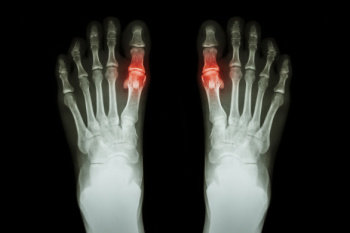159 North 3rd Street
Macclenny, Florida 32063
 Gout is a type of arthritis caused by the accumulation of uric acid crystals in the joints, often affecting the feet, particularly the big toe. It leads to sudden, severe pain, in addition to redness and swelling. Gout predominantly affects middle-aged men and postmenopausal women, especially those with a diet high in purines, a substance found in red meat and alcohol. The condition is often diagnosed through blood tests measuring uric acid levels and joint fluid analysis to detect urate crystals. Treatment focuses on reducing pain and inflammation with nonsteroidal anti-inflammatory drugs, corticosteroids, or colchicine. Long-term management includes medications like allopurinol or febuxostat to lower uric acid levels. For foot-specific care, patients may elevate the affected foot and wear comfortable, supportive footwear to alleviate symptoms and prevent flare-ups. Preventing gout involves maintaining a healthy diet, staying hydrated, and avoiding foods high in purines. Regular exercise and weight management are also critical. If you have gout that is negatively impacting your feet, it is suggested that you consult a podiatrist for specialized care and tailored advice.
Gout is a type of arthritis caused by the accumulation of uric acid crystals in the joints, often affecting the feet, particularly the big toe. It leads to sudden, severe pain, in addition to redness and swelling. Gout predominantly affects middle-aged men and postmenopausal women, especially those with a diet high in purines, a substance found in red meat and alcohol. The condition is often diagnosed through blood tests measuring uric acid levels and joint fluid analysis to detect urate crystals. Treatment focuses on reducing pain and inflammation with nonsteroidal anti-inflammatory drugs, corticosteroids, or colchicine. Long-term management includes medications like allopurinol or febuxostat to lower uric acid levels. For foot-specific care, patients may elevate the affected foot and wear comfortable, supportive footwear to alleviate symptoms and prevent flare-ups. Preventing gout involves maintaining a healthy diet, staying hydrated, and avoiding foods high in purines. Regular exercise and weight management are also critical. If you have gout that is negatively impacting your feet, it is suggested that you consult a podiatrist for specialized care and tailored advice.
Gout is a painful condition that can be treated. If you are seeking treatment, contact Dr. John L. Coleman from Florida. Our doctor will treat your foot and ankle needs.
What Is Gout?
Gout is a form of arthritis that is characterized by sudden, severe attacks of pain, redness, and tenderness in the joints. The condition usually affects the joint at the base of the big toe. A gout attack can occur at any random time, such as the middle of the night while you are asleep.
Symptoms
Risk Factors
Prior to visiting your podiatrist to receive treatment for gout, there are a few things you should do beforehand. If you have gout you should write down your symptoms--including when they started and how often you experience them, important medical information you may have, and any questions you may have. Writing down these three things will help your podiatrist in assessing your specific situation so that he or she may provide the best route of treatment for you.
If you have any questions, please feel free to contact our office located in Macclenny, FL . We offer the newest diagnostic and treatment technologies for all your foot care needs.